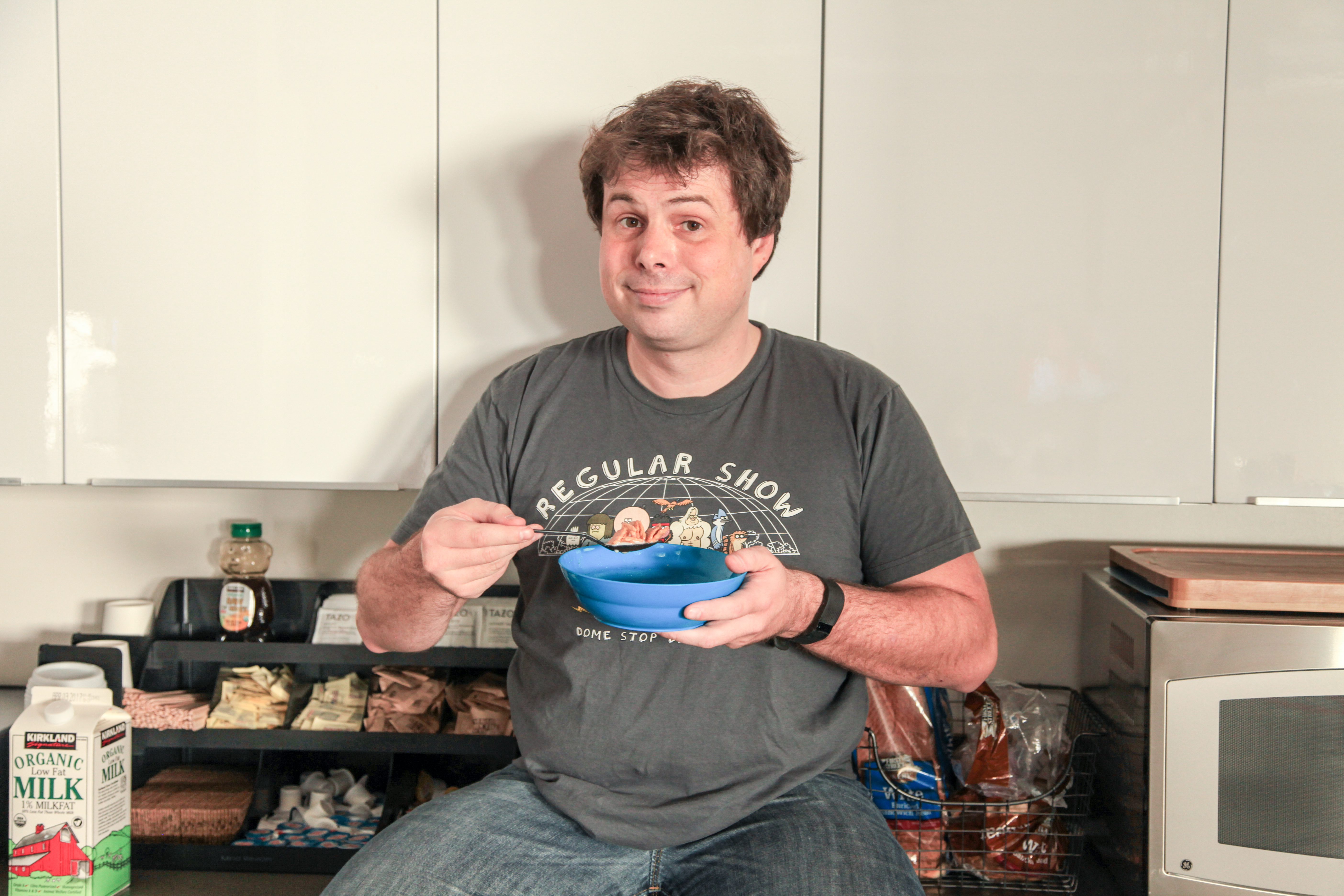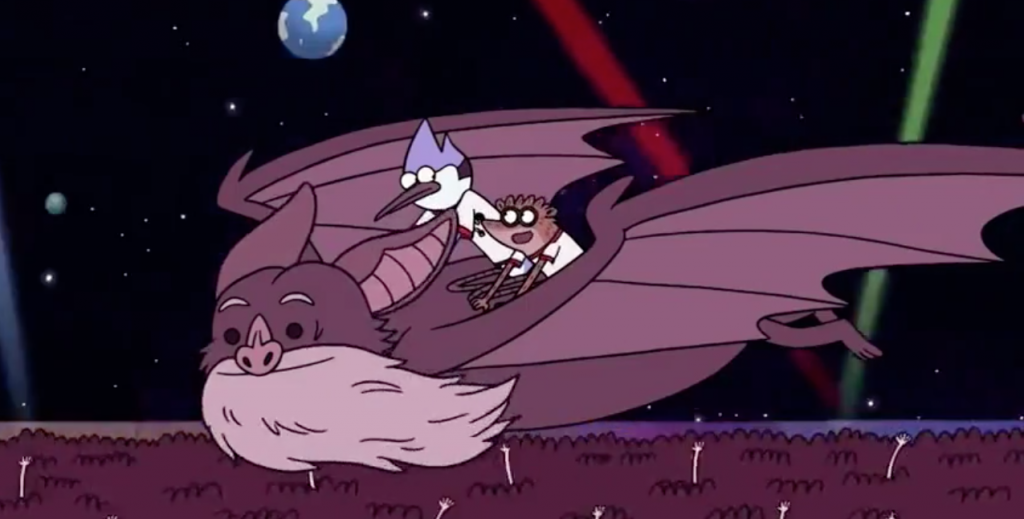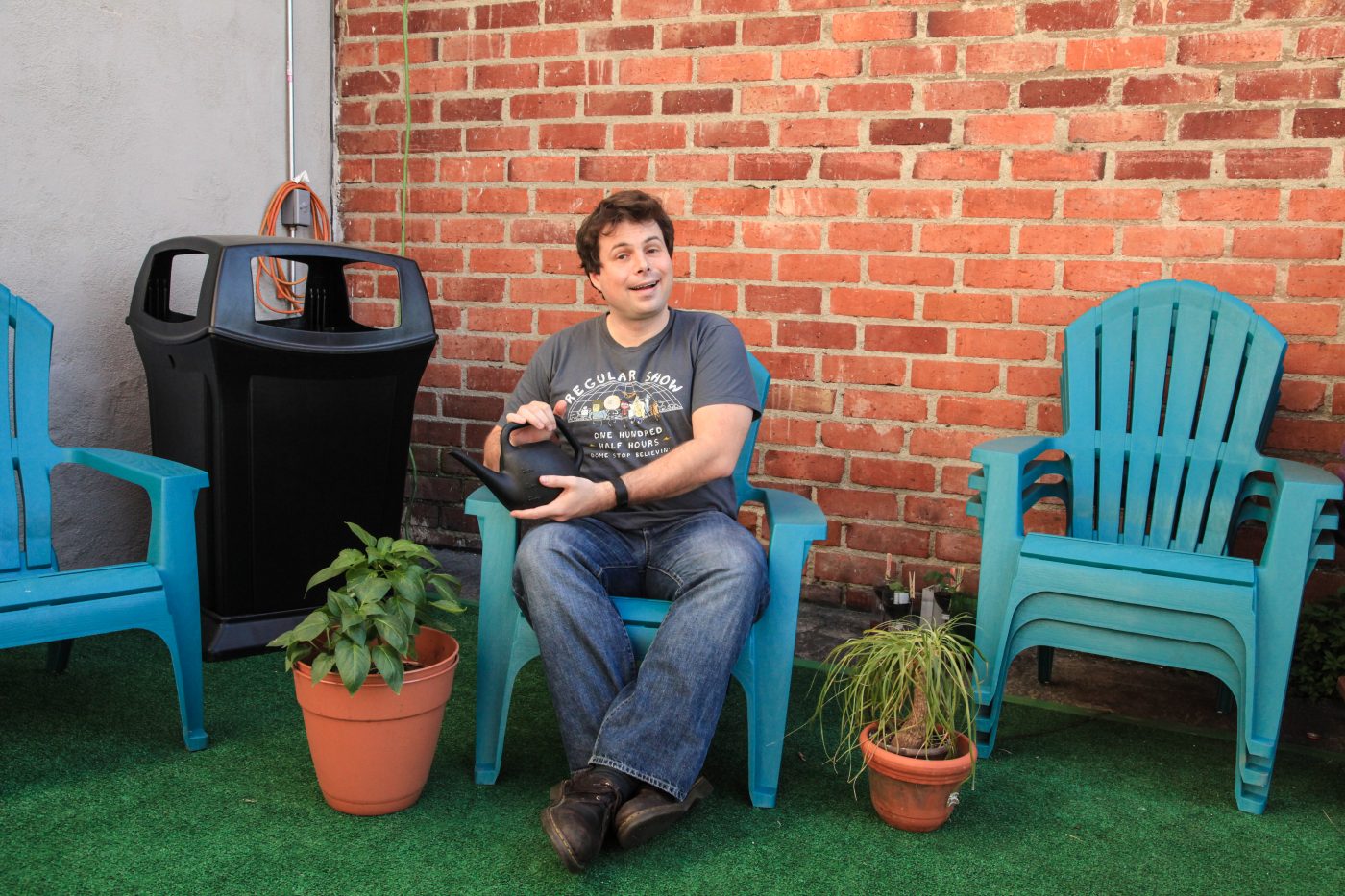Patrick Baker and I meander into an upscale Hollywood bar within a hotel, a place where you dictate your ingredients of choice to the bartender and he whips up something appropriate. It’s one of Baker’s nearby favorites, close to the BuzzFeed office where he works, and despite our too-casual dress (he’s in a hoodie; I’m wearing flannel), he confidently approaches, orders, and walks his handsome cocktail back to a dimly lit booth.
When it’s my turn, I sputter out the only things I can think I like in a drink—whiskey and spice—and I’m handed what resembles Pepto-Bismol with a sprig of something green. I’m convinced my sophomore-at-a-liberal-arts-school attire and indecisiveness have inspired the bartender to pour me a Pinnacle Orange Whipped on the rocks rather than a fancy Fireball, but that doesn’t stop me from snapping a photo for Instagram—whatever it is, it still has a sprig.
Despite Baker’s and my similar appearance—dressed-down, average-looking, young—Baker presents himself with this humble confidence I’m immediately drawn to.
When he joined the Regular Show writing staff in 2016, the show was entering its eighth and final season. On just his third day, the show was nominated for its fifth Outstanding Short-form Animation Emmy (it was nominated for six total Emmys and awarded one in 2012). “They were like, ‘Congrats on the Emmy nomination,'” Baker recalls, “and I was like, ‘I didn’t do anything. I did nothing to earn this. Thank you for the doughnuts.'” But he didn’t feel the immense pressure someone like me, for example, would feel as a newcomer to an old (Emmy-winning) club. In fact, the “well-oiled machine” comforted him: “I wasn’t worried about what people would think. The only time I’m ever worried what people think is if my job is on the line. We cared more about ratings than what people thought on the internet.”

Regular Show wasn’t Baker’s first rodeo. He’s also written on a Canadian script-driven animated show called Bob & Doug that featured the voice talents of Dave Coulier, which seems worth noting; sketch-written for UCB; created branded content at an animation studio called Animax; written a book titled The Presidential Dickerbook, which is exactly what it sounds like; and created native ads for BuzzFeed, where he currently works full-time.
Still, his impressive CV doesn’t convince me of his immunity to audience criticism, especially for a show as big as Regular Show, but he breaks it down for me in a way that makes more sense: “No piece of art is complete unless you have what the artist wants, what the audience sees, and what the critics have to say about it—and that third piece can be contentious depending on who you’re talking to.” After some pressing, he does admit to having occasionally looked at online forums like Reddit.
“[Redditors] hated the space stuff in the beginning”—the show’s eighth season was marketed as sort of its own miniseries titled Regular Show in Space—”and then they saw that it became to be connected, and they were like, ‘OK, we can get on board with this.’ . . . There weren’t many people who got to the final episode and were like, ‘We don’t like how this ended.’”
“I was like, ‘I didn’t do anything. I did nothing to earn this. Thank you for the doughnuts.'”
Despite his resolve, Baker felt tempted enough to engage with the audience that he pitched an episode centered around fan-favorite character High Five Ghost, but it was quickly shut down by showrunner JG Quintel, who simply didn’t want to do any more HFG-centric episodes.
The decision didn’t faze Baker.
“I think if you do everything the network says, if you do everything the audience claims to want, it’s surprising how often that doesn’t actually yield the result you want,” he says. The sentiment unites his collective work experience, from writing ads to writing for Dave Coulier: “The client that has a lot of picky notes, they’re gonna have three, four, five rounds of revisions anyway. I might as well stand up and be like, ‘It’s gonna be better if we do this, trust me.’” In this way, Baker has become a voice of reason, much like Quintel, to the clients he works with. “Sometimes I don’t even know if it’ll be better, which is to say, it might be better to listen to your audience, but it’s hard to know when that is the case and when it isn’t the case. So you’re better off trusting your instinct on something.”
A maturity lies in his words . . . and his drinking. He’s only halfway done; I’ve already downed my creamsicle dream.

Much of Baker’s Regular Show job interview was spent discussing the paradoxes of time travel. If his portfolio weren’t enough, it’s obvious what landed him the gig—he has the nerdy tics of a long-time Dungeon & Dragons player with the logical follow-through of a college professor. But unlike the stereotypical “comedy guy,” who never wastes an opportunity to try out new material or crack a joke, Baker maintains a studious tone that transcends his young age. He’s incredibly smart and sharply attuned to the littlest of details, facets that become joyfully apparent in his comedy.
In one of his sketches, “Train Is Still a Band,” a 9/11 first responder wakes up from a coma in 2016 and accepts most things about the current state of the world . . . except the fact that Train is still, well, a band, a funny setup made even funnier by the fact that the joke unrelentingly persists throughout the entire sketch.
When Baker tells me he’s not sure if one of his favorite jokes from the final season of Regular Show—a bat passing through a laser light show looking the happiest it’s ever been—came from him or the storyboard artist, there’s no doubt in my mind it came from him. It’s the seemingly random, pitch-perfect brand of comedy present in all his work. For him, it doesn’t matter the medium he writes in; it’s all about the humor.
“If it’s a simple sketch or just a list, you’re trying to heighten to what’s funniest. If it has a three-act structure, then you’re answering to that, but you are still hitting like you want the action to heighten, and the jokes will probably heighten from there as well.”

Mordecai and Rigby riding a giant bat in “Stuck in an Elevator,” an episode of “Regular Show” Baker helped write. (Image: Cartoon Network)
Unlike the script-driven Bob & Doug, Regular Show was storyboard-driven, which afforded more creative freedom to the artists than the writers. On a typical day, Baker and fellow Regular Show writer Gina Ippolito would write a basic episode outline and send it to lead storyboard artist/supervising director Calvin Wong. From there, the main storyboarding team for that episode would get first crack at dialogue without much knowledge of the more specific plot points Baker and Ippolito had in mind. Then Quintel, Wong, supervising producer Sean Szeles, story editor Matt Price, Baker, and Ippolito would gather in the writers room, and everyone, in order of importance, would give notes on the finished storyboard.
As the resident newbie, this often meant Baker went last.
Being one of the final people to chime in had its upsides though. Baker could often build upon existing jokes, tighten up certain plot points, and, of course, suggest brand-new jokes or pieces of dialogue that could further improve the episode both comedically and structurally.
For me, as a television-obsessed person who has written his fair share of lists and never once been anywhere near a writers room, I can’t imagine the similarities between working on an Emmy-winning TV show and writing branded content, as Baker had previously hinted at. He’s quick, however, to point out it’s not sunshine and rainbows on either side of the fence.
“You get notes in everything. I don’t think I’ve ever had a form of writing where you don’t get notes from the network or your boss. There’s always some level of feedback; that’s pretty consistent the whole time.
“No piece of art is complete unless you have what the artist wants, what the audience sees, and what the critics have to say about it.”
“Regular Show was so long in the tooth by the time I got there, the network was more or less letting JG [Quintel] do whatever he wanted. With that said, we did get a lot of notes, but they were never from the client or the network—they were always from our showrunner.”
Baker describes what sounds like a hilarious and whip-smart Top Gun parody episode that had “philospher’s axed” into something unrecognizable after Quintel’s notes. But while the episode’s point A to point B changed significantly, Quintel’s intention wasn’t to kill the jokes themselves—it was just to reroute the narrative, allowing the jokes to morph as a result.
“But when the client wants something insane, it becomes way different,” Baker says. “And that is something that hasn’t really happened with my TV writing experience.”
Moral of the story? Clients can be real joke-killers, folks.
Despite dropping truth bombs as casually as tying his shoes, Baker breaks out his token optimism even when discussing hard-to-work-with clients, citing a “social film” series produced by Intel and Toshiba he’s fond of called The Beauty Within. He thinks this intersection of branded content and traditionally unbranded formats—podcasts, movies, video games—could prove to have a lucrative future. He’s a big fan of Clickhole, for example—a satirical media publication that pokes fun at other clickbaity startups—which has recently started publishing branded articles.

“I have no problem with things being sponsored if they also feel genuine,” he says, “but the hard part is getting the brand to back off. Same as it is to get the network to back off. Because anybody, once they put money in the game, is really worried about making sure that money does what they want it to do.”
While Baker has casually segued from discussing his cool-as-hell Cartoon Network job to empathizing with clients, I can’t help but still selfishly dream of just being in a writers room. Would I possess Baker’s same confidence and assertiveness? Would the “cool factor” inhibit me from treating it as just another job? Around anyone else, I might feel more jealous, more insecure, but Baker’s professionalism is at once inspiring and reassuring. Speaking with him, matters of attainability and coolness seem moot.
During a brief lull in our conversation, I revisit my watered-down drink and quickly down the dregs, leaving behind just a pretty leaf in an empty glass.

It’s only my second time in LA, but I already feel as if I have a solid grasp of which stereotypes are true and which aren’t. The one about everyone working in and talking about the entertainment industry? In my experience, at least, overwhelmingly true.
During my first visit a year ago, while enjoying my last meal before I had to fly back to New York, I overheard a conversation between two guys sitting at the table next to mine. One asked the other, “So . . . are you going to support my box office this weekend?” He was a production assistant on Suicide Squad. The punchline writes itself.
As people start exiting the bar Baker and I are sitting in, the small room quiets. Baker’s voice, already naturally loud but amplified for the recorder, suddenly sounds like an announcer’s. As we exchange nerdy takes on the ethics of canon and non-canon material as it pertains to the viewer–show relationship (yeah, I know), now for all to hear, I realize we’re the epitome of the stereotype I’ve witnessed.
I may not possess the same assuredness as Baker, but we do share a similar passion, and for that reason I’m not only OK with being a Hollywood cliché for a night, I’m happy about it.
I start to see how working on multiple projects or putting time in at various jobs over the course of years could help strengthen the tendrils connecting passion and confidence. The latter is learnable; the former is more innate.
“My stupid dick book I’m as proud of as any show I’ve written on,” Baker says. “With Regular Show, suddenly everyone was like, ‘Great, you’re a TV writer on an Emmy-winning show. Congrats!’ But I was like, ‘Oh, this feels no different. This is the same feeling.'” His tone is genuine. Soft. “The value of just working on something ends up being the most valuable thing.”
As we leave the bar, I slide my phone into my right pocket, forgetting there’s a gaping hole in it I’ve been too lazy to do anything about. My phone falls straight through and down the inside of my too-tight pant leg. “Could you, uh, cover me for a second?” I ask Baker, pushing the phone down to my ankle as awkwardly as untucking a wedgie. I snake my fingers up the cuffed bottom and—aha!—finally pull the phone back out.
I want to panic over the awkwardness or say something self-deprecating or walk away as quickly as humanly possible, but Baker just watches nonjudgmentally as I stand back up and collect myself.
It’s simply something funny to remember.
 Photography by Eileen Connors
Photography by Eileen Connors
